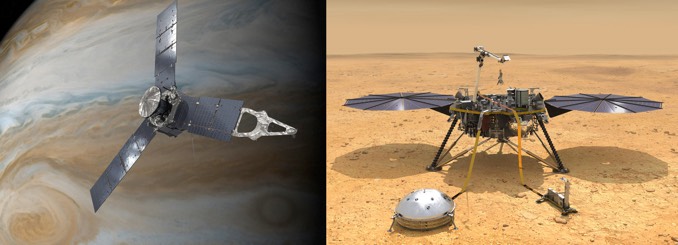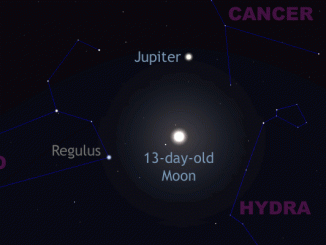
An independent review panel has recommended that NASA extend the missions of the Juno and InSight spacecraft exploring Jupiter and Mars respectively because both have “produced exceptional science.”
Launched in August 2011, Juno braked into an elliptical polar orbit around Jupiter in July 2016, making repeated passes over the giant planet’s cloud tops to study its interior structure, its powerful magnetic field and magnetosphere and the dynamics of its turbulent atmosphere. The review board recommended extending Juno’s mission through September 2025 or the spacecraft’s end of life, whichever comes first.
Along with continuing Juno’s primary lines of research, mission managers say they will expand the spacecraft’s investigations of Jupiter’s rings and moons with targeted, close flybys of Ganymede, Europa and Io.
InSight, an acronym for Interior Exploration using Seismic Investigations, Geodesy and Heat Transport, was launched in May 2018 and landed on the red planet’s Elysium Planitia the following November. The spacecraft is equipped with an ultra-sensitive French Space Agency seismometer, a sophisticated weather station supplied by Spain and a sub-surface temperature probe provided by the German Aerospace Center.
Engineers have had problems getting the Heat Flow and Physical Properties sensor to hammer its way to a planned depth of 5 metres (16 feet), but the Seismic Experiment for Interior Structure has spent a full martian year studying Mars’ crust and mantle, detecting Marsquakes and characterising “robust” tectonic activity. At the same time, the spacecraft’s other instruments have collected valuable data on the martian atmosphere.
InSight’s mission will be extended for another two years through December 2022.
“The senior review has validated that these two planetary science missions are likely to continue to bring new discoveries, and produce new questions about our solar system,” Lori Glaze, director of the planetary science division at NASA Headquarters, said in a statement.
She thanks the panel members and the “mission teams as well, who will now continue to provide exciting opportunities to refine our understanding of the dynamic science of Jupiter and Mars.”



